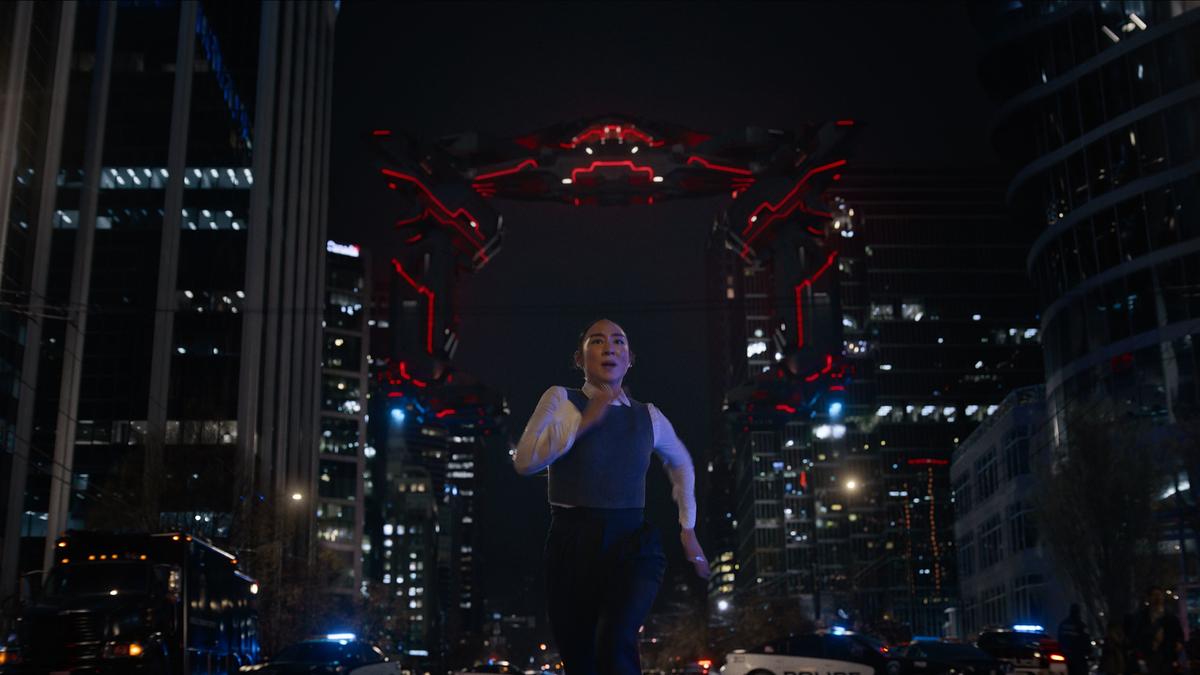Decades after the Grid first lit up our imagination, Tron rolls back into theatres in an age where AI runs the boardroom. When your franchise legacy is a digital frontier of glowing lines and flying discs, returning in the era of tech mo(ghouls) peddling AI like pyramid schemes is quite a gamble. Director Joachim Rønning seems to know this, which is why this third entry in the series plays out like a maximalist audio-visual symphony, sleek enough to see your reflection in, yet entirely aware of its own narrative shortcomings. The plot is tertiary and the Grid still owns our eyes and ears.

Rønning trades the ethereal bio-digital jazz of Tron: Legacy for something more muscular and kinetic, yet just as hypnotic. Joseph Kosinski’s evocative meditations on cyberspace have been replaced with a full-throttle, sensory blitz that makes sitting in a theatre seat feel like strapping into a Recognizer.
Tron: Ares (English)
Director: Joachim Rønning
Cast: Jared Leto, Greta Lee, Evan Peters, Jodie Turner-Smith, Hasan Minhaj, Arturo Castro, Gillian Anderson, Jeff Bridges
Runtime: 119 minutes
Storyline: Humankind encounters AI beings for the first time when a highly sophisticated programme, Ares, leaves the digital world for a dangerous mission in the real world
The film picks up in the absence of Sam Flynn, whose 15-year disappearance leaves a vacuum now contested by two tech empires: ENCOM, led by the new idealist Eve Kim (Greta Lee), and Dillinger Systems, helmed by the bratty, tech dude-bro Julian Dillinger (Evan Peters), who apparently wants infinite Jared Letos. At stake is the “permanence code” — a coding Rosetta Stone capable of making digital creations last beyond their ephemeral 29-minute lifespan in the real world.
The stakes are obvious, though Jesse Wigutow’s vapid, perfunctory script itself make them feel exasperating at times. Fifteen years to craft a sequel and the script reads like a lazy, hollow committee brainstorm nobody believed in, clueless about what made the originals click. But the ridiculousness of the dialogue scarcely matters, because the movie is operating on a different frequency altogether.
That frequency is Trent Reznor and Atticus Ross. Where Daft Punk’s legendary score for Legacy was a genre-defining blend of elegant electronic arpeggiations and analog warmth, Nine Inch Nails brings the industrial throb of Vancouver to the Grid, transforming Ares into a visceral, vibrating organism. Every chase, explosion, or ribbon of neon light feels synced to this particle-laser fever dream that thrums through your ribcage, turning what could have been a forgettable CGI slop into a theatrical event. The teeth-rattling rumble of IMAX speakers coupled with the relentless tremble of your seat — this is corporeal cinema at its finest.
The spectacle is nearly omnipresent. Rønning’s direction never allows the eye a dull moment. Lightcycles slicing through city streets leave trails of incandescent fury, Recognizers loom like industrial monoliths, and sequences involving wingsuits, tanks, and assassin droids darting across the Sea of Simulation unfold through a multiplicity of stylised perspectives. The visual grammar imbibes the aesthetics that made the Grid a cult classic symbol of digital fantasy, while boldly overlaying the franchise’s DNA in an almost militant postmodernist collision.
Leto seems to be doing something quieter and more deliberate here, playing the titular programme. Ares begins as Julian’s perfect obedient soldier, but a raindrop on his hand, a firefly on his finger, and a Depeche Mode track later, we see the glitch becoming a choice. There are echoes of Blade Runner in the self-actualisation of his digital consciousness but the evolution is mostly predictable. Leto’s Zen-like restraint keeps it watchable, even as the internet frets over his predatory real-life controversies potentially derailing the legacy of the franchise.
The film also gestures clumsily towards philosophical musings about human ambition and the mutable boundaries between synthetic and organic, that feel like ctrl+c, ctrl+v from better sci-fi. But the film’s here to dazzle, not sermonise, and Rønning knows how to make their absence irrelevant, with his aggressive sensory spectacle eclipsing these faltering explorations.

A still from ‘Tron: Ares’
| Photo Credit:
Disney
When Ares finds himself transported back into a luminous, retro ’80s-inspired love letter to the original film, the moment reminds us why this franchise has a devoted cult following. It’s here that Jeff Bridges makes a brief, but meaningful, cameo as Kevin Flynn. Watching Flynn interact with Ares, exchanging a few knowing words, a wry smile, and a modest affirmation of the programme’s emerging consciousness, is unexpectedly earnest.
In a post-Legacy world, the franchise risked becoming a digital mausoleum, but Ares seems to have restored its pulse. Yes, the script is atrocious at times, the characters are archetypal, the exposition heavy, and the dialogue clunky. But somehow, none of that stops the movie from being unmissable because Rønning’s fluid, whip-smart choreography and NIN’s body-rattling score conspire to create a fully realised cinematic event that’s bigger than the sum of its script.

Tron has always felt so special for the way it makes us feel that dreamy, nostalgic bio-digital jazz, and that sensation has been derezzed and reprogrammed as flamboyant corporeal grunge. Ultimately, Ares isn’t trying to change the conversation around AI, identity, or impermanence. It just wants to throw an acid rock rave in the middle of the preaching and hope we remember the light show. This is a film best experienced loud, large, and with a willingness to let the sound and fury sweep you away.
Tron: Ares is currently running in theatres
Published – October 10, 2025 06:23 pm IST
